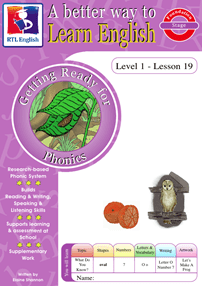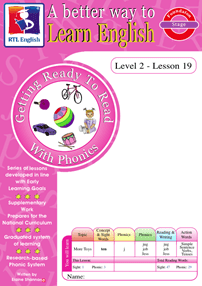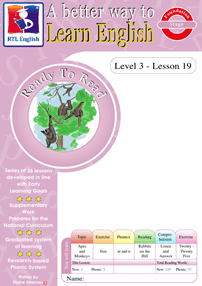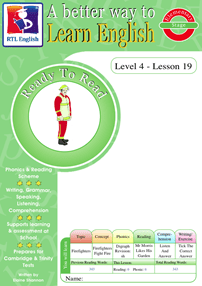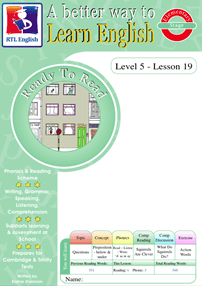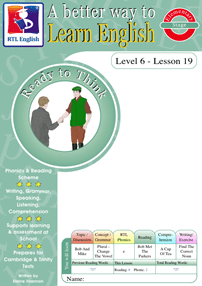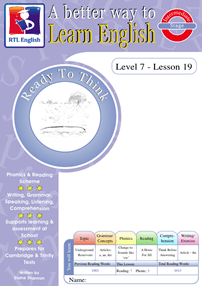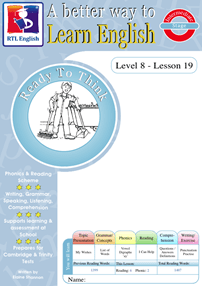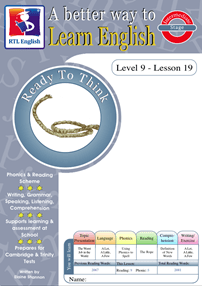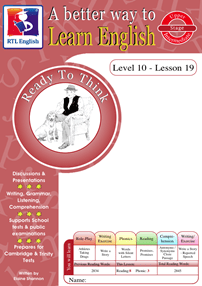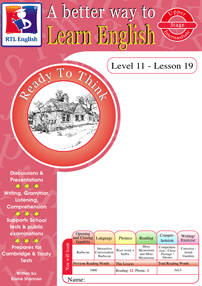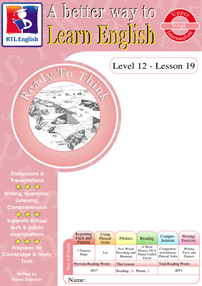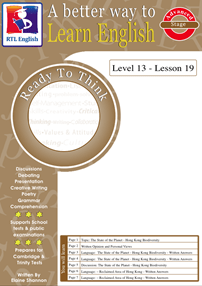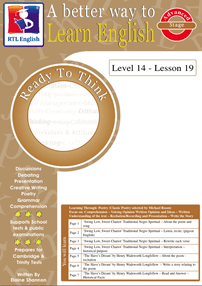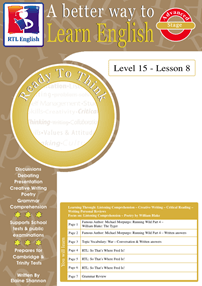English lessons for kids in Spokane, Washington

For nearly 30 years, RTL English has been taught in tutorial centres, homes & at schools both as part of the curriculum & as a supplementary activity. RTL English is growing in popularity worldwide, so why not join tens of thousands of parents, tutors & teachers around the globe and teach your son or daughter RTL English today?
Teaching your son or daughter to use English fluently might very well be the key to their success in school in Washington, in exams, in his or her career & beyond.
Teaching English to your son or daughter might be the key, not only to his or her success in school in Spokane, but also their sense of self-worth, both in Washington and beyond.
Elaine Shannon, Author & Curriculum Designer Tweet
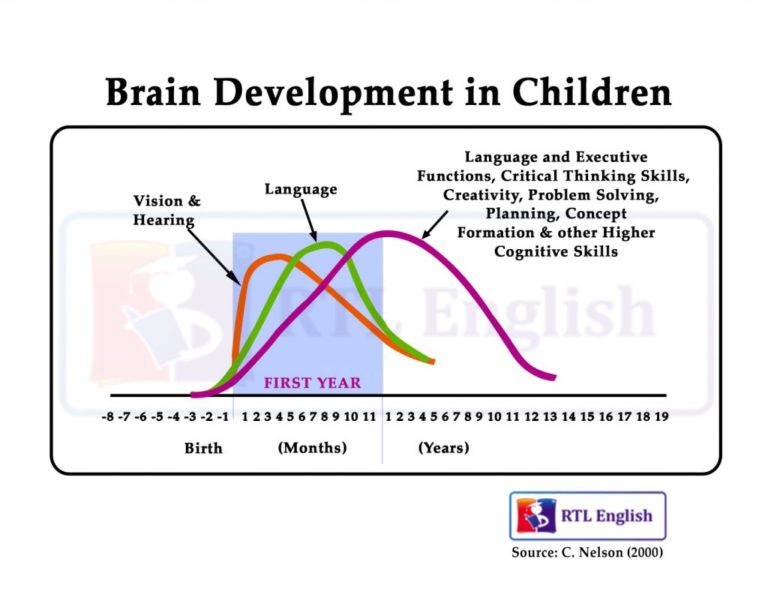
- Early & advanced English skills will make your child smarter.
- Early & advanced English skills will improve problem solving.
- Early & advanced English skills will improve planning, & abstract thinking skills.
- Early & advanced English skills will help develop complex idea comprehension.
- Early reading can help children compensate for modest levels of ability in other areas. (*Ref)
ON A PRACTICAL LEVEL, HOW IMPORTANT IS EARLY READING?
- Your child’s reading ability & vocabulary at 3 years old might predict his or her success in school in Spokane when they are 6 to 7 years old (*Ref).
- Your son or daughter’s reading ability at 6 to 7 years old might predict their success at 17 to 18 years old (*Ref)!
- Your child’s reading ability at 7 to 8 years old might determine his or her graduation from senior school in Spokane (*Ref).
ON THE OTHER HAND:
- Children who can’t read fluently by 7 to 8 years old are four times more likely to leave school without a diploma/results than proficient readers (*Ref).
and:
- Children who are not taught Phonemic Awareness, and therefore have to rely on memory have difficulty beginning to read and continue to have difficulty with new words.
BUT, SURELY SCHOOL WILL TEACH MY CHILD TO READ? SO, WHY DO I NEED TO BOTHER?
If this is what you are thinking, then you should know that you cannot rely on schools, including those in Spokane …
- In the USA, almost 70% of children at school who are aged 9-10 years old cannot read proficiently (*Ref)!
- And, of those children, 33% of them read at only a very basic level, and 34% are reading at a very unsatisfactory level (*Ref).
- It’s not much different in the UK, where over 100,000 children leave school illiterate(*Ref).
- Or in Australia, where 33% of students aged 11 years old fail to meet literacy benchmarks (*Ref).
- Or in Canada, where 42% of the entire adult population is only semi-illiterate (*Ref).
NO, YOU CANNOT RELY ON SCHOOLS.
But, why not?
- Teachers don’t always appreciate the basic building blocks of language & reading
- Teachers often don’t know how to teach English language concepts
- There just aren’t enough qualified teachers
- Classes are too big
- Kids don’t get enough 1-on-1 attention from teachers in the classroom
- Schools aren’t using the correct teaching systems – i.e they rely on rote learning or sight words
- Schools are overwhelmed and have tried to shift some of the burden of teaching onto apps and computers
UNFORTUNATELY, IT IS A FACT THAT:
Being illiterate is a guaranteed ticket to a dead end.
YOU NEED TO TAKE CHARGE OF YOUR CHILD’S EDUCATION – TODAY!
BUT HOW?
You can begin by teaching English to your child.
By Teaching your child to read your son or daughter will develop early reading skills that will help put them years ahead of other children in Washington. So, if you’ve decided that you want to become a proud parent of a happy & smart child, then you owe it to your child to teach them to read and improve their English.
WE HELP PARENTS TEACH ENGLISH TO CHILDREN
RTL English™ offers 600 easy-to-teach & downloadable English lessons for parents to teach to his or her child at home. Our lessons will help your child to catch up, keep up and get ahead! Our workbook lessons also challenge more advanced students; so whatever your son or daughter’s ability, there’s sure to be an RTL English lesson that’s suitable for them.
THE RTL ENGLISH CURRICULUM CONSISTS OF FIFTEEN YEARS (LEVELS) OF TEACHING MATERIALS WHICH INCLUDE SIX HUNDRED LESSON WORKBOOKS COMPRISED OF FOUR THOUSAND WORKSHEETS AND 19,000 TEACHING NOTES AND WILL SAVE YOU OVER TWO THOUSAND DAYS OF LESSON PREPARATION TIME!
Foundation Stage
Includes Level 1, 2 & 3.
Suitable for kids aged 3-6 years old in Spokane, Washington
Elementary Stage
Includes Level 4, 5 & 6.
Suitable for kids aged 6-9 years old in Spokane, Washington
Intermediate Stage
Includes Level 7, 8 & 9.
Suitable for kids aged 9-12 years old in Spokane, Washington
Upper Intermediate Stage
Includes Level 10, 11 & 12.
Suitable for kids aged 12-15 years old in Spokane, Washington
Advanced Stage
Incl. Level 10, 11 & 12.
Suitable for kids aged 15-18 years old in Spokane, Washington
Winning Awards Since 1996
With 24 years of research, development, dedication and experience, RTL English is committed to offering the best possible start to English language learners worldwide. RTL English is part of the Ready To Learn group, an international educational organisation with students worldwide.
Elaine Shannon founded Ready To Learn in 1996, and is an internationally respected author, language expert and School Principal with more than 40 years of specialist experience. Elaine & her team of instructional designers, linguists and educational experts developed the RTL English Curriculum.
What Happens In A Lesson?
- Each lesson is designed to last approximately 60 minutes. Normally, your child will spend 55 minutes participating in learning activities, and 5 minutes completing an achievement exercise that’s used to reinforce the lessons’ learning designs & objectives.
- Each lesson is accompanied by an RTL English lesson workbook. The workbook consists of six worksheets of instructional content and one reinforcement exercise page.
- You will use the workbook & teaching notes to guide and lead your child through the variety of learning activities in the workbook.
- Although all of our workbooks follow a similar format, each one is slightly more challenging than the last in the sequence. As a result, your child will be able to advance in small manageable steps & acquire English language skills that will last them a lifetime.
- There are 5 learning stages, 15 learning levels and 600 lessons in the RTL English curriculum.
- Your child will need to complete 36 lessons to finish one learning level – which lasts approximately 1 academic year.
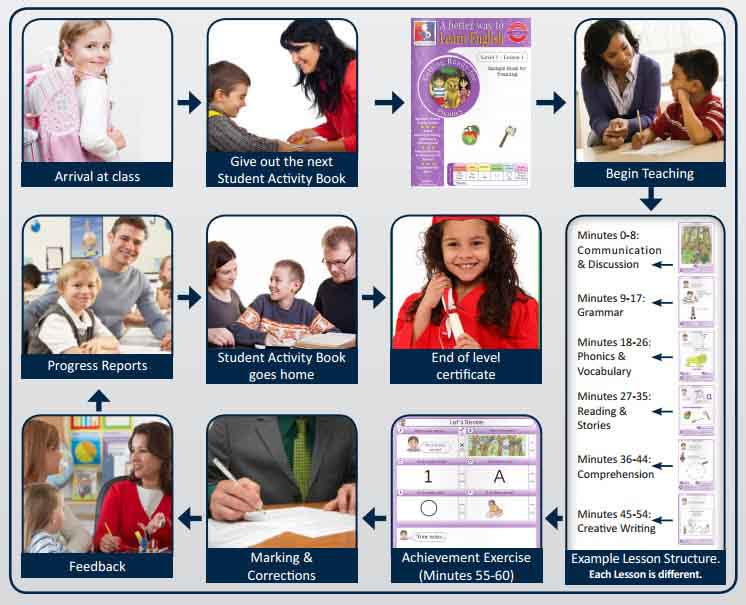
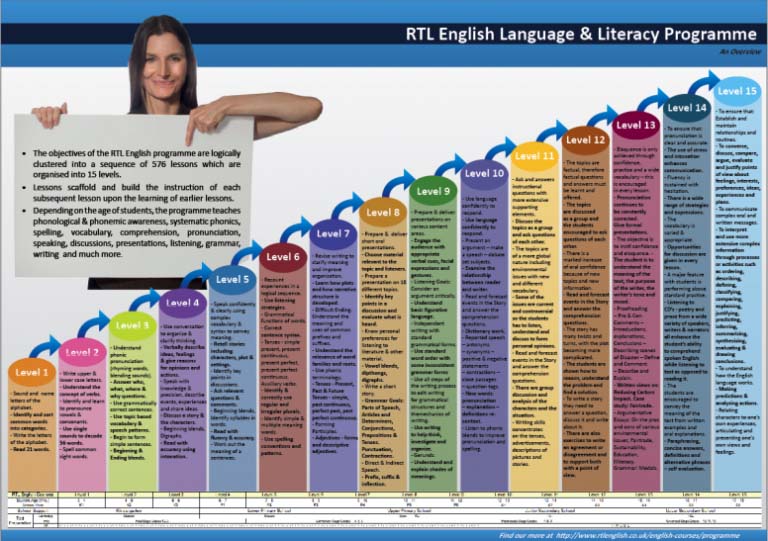
What Will My Child Be Taught?
It depends on your child’s age and their English language ability. To find out what your child will be taught, please click the grey button & then click the book cover that’s closest to your child’s current age → Lesson Workbooks
The RTL English Curriculum teaches all the communicative functions and language forms your child will need to succeed in school, exams and beyond, including:
- Phonemic Awareness
- Alphabetic Principle
- Systematic & Explicit Phonics
- Fluency with Text
- Proficient Grammar Knowledge
- Creative Writing
- Expanded Vocabulary
- Advanced Comprehension, and
- Confident Speaking Skills
The RTL English Curriculum: Kids 3 to 18 Years Old
Whatever your child’s age or English language ability, there is sure to be an RTL English course (aka ‘level’) that will help your child learn or improve his or her English. This is because our curriculum provides 15 years of learning for child aged 3 to 18 years old and teaches all the communicative functions and language forms your child will need to have a richer, more successful educational experience. RTL English will also supplement your son or daughter’s learning at their school in Spokane.
The RTL English Curriculum consists of 15 years (levels) of teaching materials which include 600 workbooks (comprising 4,000 worksheets & 19,000 teaching notes) & saves over 2,000 days of preparation time.Level 1
Kids: 3-4 years old
36 lessons. 36 workbooks. 252 worksheets. 1134 teaching instructions.
Level 2
Kids: 4-5 years old
36 lessons. 36 workbooks. 252 worksheets. 1134 teaching instructions.
Level 3
Kids: 5-6 years old
36 lessons. 36 workbooks. 252 worksheets. 1134 teaching instructions.
Level 4
Kids: 6-7 years old
36 lessons. 36 workbooks. 252 worksheets. 1134 teaching instructions.
Level 5
Kids: 7-8 years old
36 lessons. 36 workbooks. 252 worksheets. 1134 teaching instructions.
Level 6
Kids: 8 -9 years old
36 lessons. 36 workbooks. 252 worksheets. 1134 teaching instructions.
Level 7
Kids: 9-10 years old
36 lessons. 36 workbooks. 252 worksheets. 1134 teaching instructions.
Level 8
Kids: 10-11 years old
36 lessons. 36 workbooks. 252 worksheets. 1134 teaching instructions.
Level 9
Kids: 11-12 years old
36 lessons. 36 workbooks. 252 worksheets. 1134 teaching instructions.
Level 10
Teens: 12-13 years old
36 lessons. 36 workbooks. 252 worksheets. 1134 teaching instructions.
Level 11
Teens: 13-14 years old
36 lessons. 36 workbooks. 252 worksheets. 1134 teaching instructions.
Level 12
Teens: 14-15 years old
36 lessons. 36 workbooks. 252 worksheets. 1134 teaching instructions.
Level 13
Teens: 15-16 years old
36 lessons. 36 workbooks. 252 worksheets. 1134 teaching instructions.
Level 14
Teens: 16-17 years old
36 lessons. 36 workbooks. 252 worksheets. 1134 teaching instructions.
Level 15
Teens: 17-18 years old
8 lessons. 8 workbooks. 56 worksheets. 252 teaching instructions.
Can I See A Lesson Workbook?
There are 600 workbooks like the one below. Lesson 19, Level 1 below suits children between 3 and 4 years old. To see an example of a lesson workbook that is likely to suit your child, please click the grey button & then click the book cover that’s closest to your child’s current age → Lesson Workbooks
What Method Do You Use?
- We teach using a Step-by-Step method. The content of each lesson is determined by an 8-page workbook that’s slightly more challenging than the last in the sequence. Lessons ‘scaffold’ and build upon the learning of the previous lesson. As a result, students advance in small, manageable steps and acquire English language skills that enable them to achieve better results in school, exams & beyond..
- Sequenced instruction is organised into 5 developmentally appropriate stages, 15 levels of increasing difficulty and 600 lessons. Each lesson provides one hour of learning per week and follows a workbook that consists of six worksheets with instructional content and one reinforcement exercise page.:
- Each lesson is accompanied by a workbook follows a similar plan:
- Page 1 :: Communication/ Discussion/ Topic orientated
- Page 2 :: Grammar/ Language
- Page 3 :: Phonics/ Vocabulary
- Page 4 :: Reading (Ongoing Story)
- Page 5 :: Story Comprehension/ Language
- Page 6 :: Grammar/ Language Exercise
- Page 7 :: Achievement Exercise / Assessment
- Depending on your child’s age and their English skills, instruction will typically consist of a variety of activities including speaking, listening, letter-sound correspondence, sight words, guided oral reading, text comprehension, creative writing, grammar and critical thinking.
- You don’t need to prepare anything or create teaching materials for an RTL English lesson. It’s all been done for you. Each page of this workbook contains teaching notes to enable you to guide and lead your child through the learning activities. Once your son or daughter has finished their lesson, record their achievements in the progress report form and then simply print the next workbook in the sequence.
Will My Child Learn Phonics?
- Yes! We teach synthetic & analytical phonics which includes 44 basic phonemes, 22 beginning blends and 15 ending blends.Our students learn and practise phonics throughout our Foundation, Elementary, Intermediate and Upper Intermediate stages. Our Advanced stage uses phonics to teach pronunciation.
- We pay particular attention to blended consonant sounds (that are located at the beginning and end of many words). We teach vowels first and then consonants. As soon as possible we teach children to read. In practice this means after students have learnt 5 vowel sounds and 2 consonants they can read a few words by themselves. Children are also taught how to decode words, so from the very beginning they can see new simple words and know how to read them.
Spokane ( spoh-KAN) is a city in and the county chair of Spokane County, Washington, United States. It is in eastern Washington along the Spokane River against the Selkirk Mountains and west of the Rocky Mountain foothills, 92 miles (148 km) south of the Canada–U.S. border, 18 miles (30 km) west of the Washington–Idaho border, and 279 miles (449 km) east of Seattle along Interstate 90.
Spokane is the economic and cultural center of the Spokane metropolitan area, the Spokane–Coeur d'Alene comprehensive statistical area, and the Inland Northwest. It is known as the birthplace of Father's Day, and its recognized nickname is the "Lilac City". A pink double flower cultivar of the common lilac, known as Syringa vulgaris 'Spokane', is named for the city. The city and the wider Inland Northwest Place are served by Spokane International Airport, 5 miles (8 km) west of downtown Spokane. According to the 2010 Census, Spokane had a population of 208,916, making it the second-largest city in Washington, and the 100th-largest city in the United States. In 2019, the United States Census Bureau estimated the city's population at 222,081 and the population of the Spokane Metropolitan Area at 573,493.
The first people to stimulate in the area, the Spokane tribe (their reveal meaning "children of the sun" in Salishan), lived off plentiful game. David Thompson explored the area with the westward go forward and introduction of the North West Company's Spokane House in 1810. This trading say was the first long-term European settlement in Washington. Completion of the Northern Pacific Railway in 1881 brought settlers to the Spokane area. The similar year it was officially incorporated as a city below the broadcast of Spokane Falls (it was reincorporated below its current post ten years later). In the late 19th century, gold and silver were discovered in the Inland Northwest. The local economy depended upon mining, timber, and agriculture until the 1980s. Spokane hosted the first environmentally themed World's Fair at Expo '74.
Many of the downtown area's older Romanesque Revival-style buildings were meant by architect Kirtland Kelsey Cutter after the Great Fire of 1889. The city is also house to the Riverfront and Manito parks, the Smithsonian-affiliated Northwest Museum of Arts and Culture, the Davenport Hotel, and the Fox and Bing Crosby theaters.
The Cathedral of Our Lady of Lourdes is the seat of the Roman Catholic Diocese of Spokane, and the Cathedral of St. John the Evangelist serves as that of the Episcopal Diocese of Spokane. The Spokane Washington Temple in the east of the county serves The Church of Jesus Christ of Latter-day Saints. Gonzaga University was time-honored in 1887 by the Jesuits, and the private Presbyterian Whitworth University was founded three years innovative and moved to north Spokane in 1914.
In sports, the region's professional and semi-professional sports teams increase the Spokane Indians in Minor League Baseball and Spokane Chiefs in junior ice hockey. The Gonzaga Bulldogs collegiate basketball team competes at the Division I level. As of 2010, Spokane's major daily newspaper, The Spokesman-Review, had a daily circulation of higher than 76,000.
Academic References
- The Cognitive Foundations of Learning to Read: A FrameWork Sebastian Wren
- The relatonship of phonemic awareness to reading acquisiton: more consequence than preconditon but still important. Wimmer H, Landerl K, Linortner R, Hummer P. University of Salzburg, Austria.
- NAEP 1998 Reading Report Card for the Nation and the States March 1999 Authors: Patricia L. Donahue, Kris n E. Voelkl, Jay R. Campbell, and John Mazzeo
- National Institute of Child Health and Human Development. (2000). Report of the National Reading Panel. Teaching children to read: An evidence-based assessment of the scientific research literature on reading and its implications for reading instruction (NIH Publica on No. 00-4769). Washington, DC: U.S. Government Prin ng Office.
- Wikipedia: http://en.wikipedia.org/wiki/Functional_illiteracy
- J Learn Disabil. 2009 Sep-Oct;42(5):392-402. Epub 2009 Jun 19. Why elementary teachers might be inadequately prepared to teach reading. Joshi RM, Binks E, Hougen M, Dahlgren ME, Ocker-Dean E, Smith DL.
- Australia Government Department of Educa on, Science and Training: htt p://www.dest.gov.au/archive/schools/literacy&numeracy/charts.html
- CBC News: Canada’s Shame – h p://www.cbc.ca/news/background/educa on/canada-shame.html
- The Timing and Quality of Early Experiences Combine to Shape Brain Architecture Center on the Developing Child, Harvard University
- Vocabulary Development and Instruc on: A Prerequisite for School Learning Andrew Biemiller, University of Toronto iii. Early reading acquisiton and its relation to reading experience and ability 10 years later. Cunningham AE, Stanovich KE.
- Double Jeopardy How Third-Grade Reading Skills and Poverty Influence High School Gradua on Donald J. Hernandez, Hunter College and the Graduate Center
- What Reading Does for the Mind ANNE E. CUNNINGHAM and KEITH E. STANOVICH

